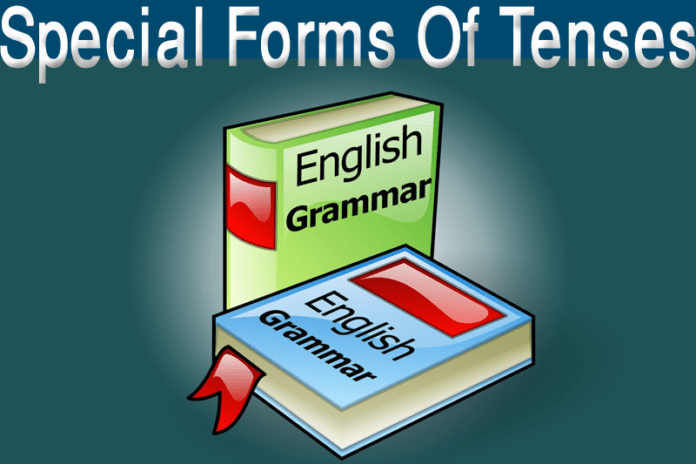The Master of Tense
By
Mohammed Mohsin ( M.A in English Literature J.U)and B.Ed 1st Class.( N.U)
Mobile:+8801814-22 25 07/+8801850-14 97 02.
Special Forms of Tenses:
1.Tense of Ability: The form of Tense which expresses the Ability of the subject or the action done by the doer. In this case, the subject is followed by “am able to/is able to/are able to/can(in the present action)” “was able to/were able to/could”(in the past action) and “shall be able to/will be able to”(in the future action) + the present form of the main verb+ object/extension/complement.
Examples: I am able to swim in the river. I can swim in the river. He was able to do it. She could do it. I shall be able to do it. They will be able to do it.
2.Tense of Possibility and Unreal Past: The action which is supposed to happen/take place but does not happen .The subject is followed by May/Might +the present form of the main verb.
Examples: It may rain today. Father might come home yesterday.
3.Discontinued Past: denotes an habitual action which would take place in the past but not continued .In this case, the subject is followed by “used to/ would”+the base /present form of the verb +object/extension/complement.
Examples: Father used to/would walk by the river every morning. Mother would read the Quran daily.
4.Tense of Condition: The Tense which denotes a supposition/ condition. Tense of Conditions are subdivided into four: As,
(a)Zero Conditional, (b) 1st Conditional
(c) 2nd Conditional and (d) 3rd Conditional.
# Zero Conditionals (Present+ Present) : A condition or supposition where both the clauses are in the Present Tense.
Examples: If you read well, you may get GPA-5. You can get vitamins if you eat fruits and vegetables.
# 1st conditionals (Present + Future): A condition or a supposition where one clause is in the Simple present and the other in the simple Future.
Examples: If you come to me, I shall help you. Unless you study well, you will cut a sorry figure in the exam.
# 2nd Conditionals ( Past Indefinite + Corresponding Past ): If one clause is in the past indefinite, the other must be in the corresponding past i, e the subject must be followed by would/could/might/ +with the present form of the verb.
Examples: If you came, I could help you. Mother would not help you unless you wanted.
# 3rd Conditionals ( Past Perfect +Corresponding Past Perfect): If one clause is in the past perfect, then the other clause must be in the corresponding past perfect i, e, the subject of this clause must be followed by “would have/ could have/ might have “+ the past participle form of the main verb.
Examples: If you had done the work, I would have helped you. Unless you had done it, you would have been punished.
5.The Sequence of Tense : The Sequence of Tenses in the principal in accordance with which the tense of the verb in the subordinate clause follows the tense of the verb in the principal.
The main rules are :
- If the verb in the principal clause be present or future, the verb in the dependant clause may be in any tense: As
He says / will say that he does/ did/ will do it.
- But if the verb in the principal clause be in the past tense, the verb in the subordinate clause should be in the corresponding past tense: As
He said that he did/had done/would do it.
Note: But when the dependent clause expresses a universal truth or habitual fact, the verb is unchanged .As
He said that honesty is the best policy/man is mortal.
- When the dependent clause denotes a comparison, then the principal clause may be followed by any tense in the dependent. As,
He loves you /loved you /will love you more than he loved/will love me.
6.Tense of Obligation: When the subject is compelled to do any action/circumstances make the subject obliged. In this case, the subject is followed by “Have to/has to/ had to”+the present form of the main verb.
Examples: I have to go home. You have to study well. He has to pass the exam. She has to play. We had to go there.
7.Tense of Non-Obligation: When the subject is not compelled to do an action. In this case, the subject is followed by “am to/ is to/are to/ was to/ were to” +the present form of the main verb.
Examples: I am to do the work. We are to play football. He is to go home. They were to help the poor.
8.Tense of Ellipsis/elliptical Sentences: The leaving out or dropping out of a word or words from a Sentence when the meaning of that sentence can be understood/realized without it/ them.
For Example: He is dead but I alive (am).
Darcy is reading and I singing (am).
Admission going on.(is)
In the sentence (1) there is an ellipsis of “am” after the subject I, as the meaning is clear. So, it is unnecessary to use it in either Spoken or Written English. In sentence (2) there is too an ellipsis after I. “am” is not used. In sentence (3) the subject “Admission” is not followed by is .Ref: Oxford Advanced Learner’s Dictionary.
9.Tense of Should/ought to: When it is the duty or moral compulsion of the Subject to do something. Then the Subject is followed by “Should/Ought to” with the present form of the verb.
Examples: I should do the work. You ought to respect your parents.
Note : when an action is supposed to happen but did not, in such case, the subject is followed by “Should have/Ought to have” with the past participle form of the verb.
Examples: You should have respected your parents.(but you did not do so) He ought to have done the work.(but he did not do)
10. Tense of Must, Need & Dare:
(a) Must: when the subject expresses determination, obligation or necessity.
Such as: We must obey the law. I must go now. I must help you. Must I go now.( this is an assertive sentence)
(b)Need: This verb is used as both Principal and Auxiliary .
Examples: He need not do it. I need to go there.
(c ) Dare: Its meaning is courage. It is used as a Modal. He dare drive at night. Dare he do it ?












